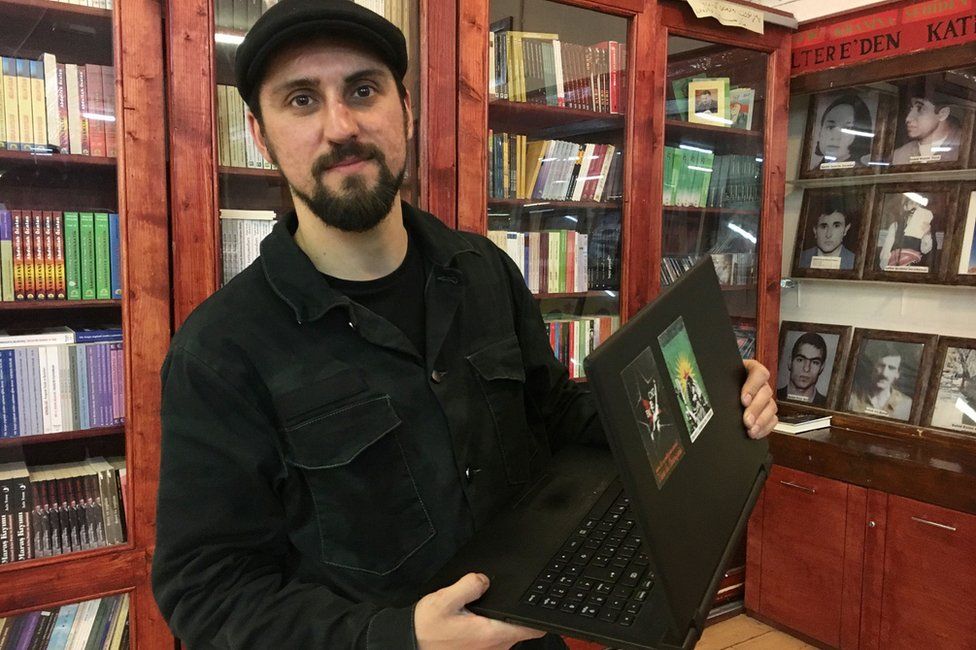Bitcoin entrepreneur Amir Taaki quizzed over fighting in Syria
- Published

A London-based software developer and "hacker" has said he is under police investigation after going to Syria to fight against the Islamic State group.
Amir Taaki, 29, a leading developer of online currency Bitcoin, was once named by Forbes as one of the most influential young people in technology.
Mr Taaki told the BBC he returned to the UK from Syria in 2016 and has spent the past 12 months on police bail.
The Foreign Office warns people not to travel to Syria for any reason.
"When I discovered Rojava [the term Kurds use to refer to northern or Syrian Kurdistan] I felt I had to go there," he told the BBC.
"At first, I was completely scared - I thought I was going to die.
"I got sent to the frontline. I had no training, and I was given a Kalashnikov. I learnt how to use a gun on the way, another Western fighter showed me."
Mr Taaki says he spent three and half months fighting with the Kurdish People's Protection Units [YPG] military group and experienced several battles against IS.
He says he was not injured in the fighting, except in one incident, he tells me laughing: "I did fall into a trench."
When asked "Did you kill anyone?" he explains that his experiences in battles with IS were at long range, so it is impossible to tell.
"I found myself on the front with a gun, I had to fight. But I wanted to go elsewhere, where my skills would be useful."
Mr Taaki says he later met with the economics committee of Rojava and began helping the Kurds with local projects, such as a crowd-funding campaign which raised money and then built fertilizer factories to help farmers growing food.
Currency plans
The Syrian Kurds are not only fighting to defeat IS, but they have the aim of creating a new kind of socialist society.
This Kurdish vision is based on revolutionary ideas of living in a much less hierarchical way than the West - a system called "democratic confederalism".
This is what Amir Taaki says truly inspired him to travel to the conflict.
"My main goal with going to Rojava was not because I opposed Isis, it's because I support their [the Kurds'] revolution. I support their politics and their struggle.
"It is the only solution for lasting peace in the Middle East."
Bitcoin, he believes, could help the Syrian Kurds.
"They're trying to create a people's economy. To establish a decentralised economy, you need decentralised money.
"Rojava's under embargo, so there's no way to move money in or out. So we have to actually create our own Bitcoin economies.
"Now we have a technological tool for people to freely organise outside state system. Because it is a currency not controlled by central banks."
But software previously developed by Amir Taaki to allow untraceable, anonymous transactions, has been criticised by authorities because it may be used for money laundering or to fund organised terror groups.
When he returned to London in 2016, Mr Taaki says he was arrested at the airport and questioned under counter-terror legislation.
"I was not expecting it at all," he says.
"They stopped the plane, and they arrested me. They confiscated computers, phones and everything".
He says he has been told by police that he remains under investigation.
"I don't support terrorism or terrorist acts. What's the political motive in keeping an investigation open against me?"
Rejects lavish lifestyle
There are no reliable figures for how many British people have gone to fight with the Kurds.
The YPG itself estimates that "hundreds" of volunteers from many countries have fought with it.
The YPG is not a banned group in the UK, but is considered a terror organisation by Turkey, which has a history of conflict with the Kurds.
Mr Taaki was once tipped to be a future billionaire.
He could work in Sillicon Valley and enjoy an incredible career. So why not, I ask?
"I could go and live on a beach in Brazil and party," he tells me. "I don't want that, though."
When challenged on why he needed to pick up a gun at all, he replies: "I'm glad about it, to be honest, it was an important experience to have."
A Metropolitan Police spokesman said: "Everyone who returns from taking part in the conflict in Syria or Iraq must expect to be reviewed by the police to determine if they have committed criminal offences and to ensure that they do not pose a threat to our national security."
Watch a special piece with Amir Taaki on the Victoria Derbyshire Show on BBC1 on Thursday at 9am. The Daily Politics programme will discuss the government's stance on fighting in Syria on BBC2 on Friday at noon.
- Published19 September 2014
- Published17 March 2016